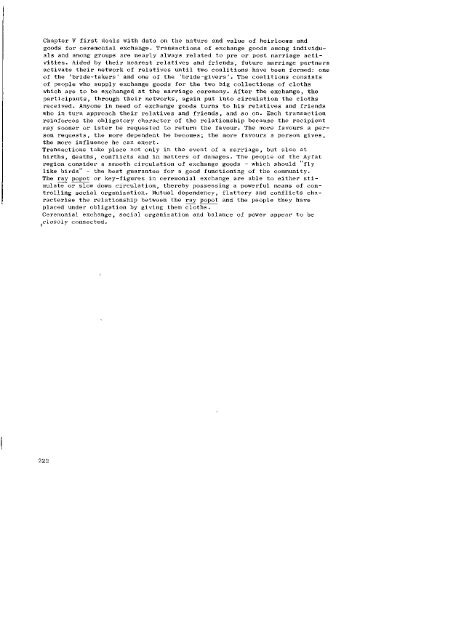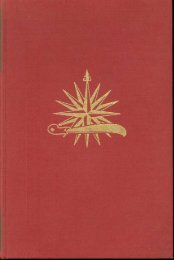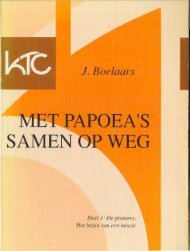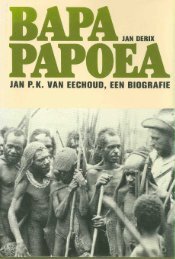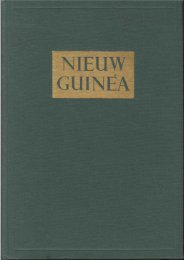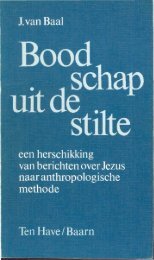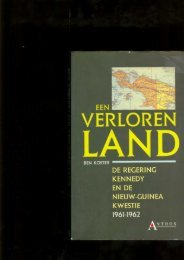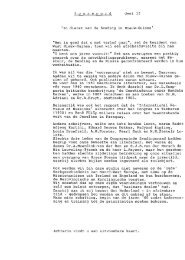- Page 2 and 3:
PROMOTOR: PROF. DR. A.A. TROUWBORST
- Page 4 and 5:
Aan: Charlotte en de mensen van Aya
- Page 6 and 7:
Het onderwijs Twee culturen 7 Verwa
- Page 10 and 11:
VERANTWOORDING Deze ethnografie is
- Page 12 and 13:
I HET AYAFATGEBIED 1 De topografisc
- Page 15 and 16:
Dit geldt niet alleen voor de mense
- Page 17 and 18:
ontstond de behoefte aan een stabie
- Page 19 and 20:
kingssamenstelling in het totale ge
- Page 21 and 22:
Aanvankelijk vonden de meeste conta
- Page 23 and 24:
vragen of hun aanwezigheid gewenst
- Page 25 and 26:
ied uitbreidt tot de omgeving van d
- Page 27 and 28:
sie gefinancierd worden, komen snel
- Page 29 and 30:
II MIDDELEN VAN BESTAAN EN MATERIEL
- Page 31 and 32:
door in de tuin of in huis, waar zi
- Page 33 and 34:
Owe ara = de pinangboom waarvan de
- Page 35 and 36:
slaapmatten en regencapes van te ma
- Page 37 and 38:
plaats. Een aantal mannen bouwt aan
- Page 39 and 40:
tussen de takken van een niet al te
- Page 41 and 42:
melk en suiker. Deze artikelen kope
- Page 43 and 44:
Ayawasi wel zoveel geld in omloop d
- Page 46 and 47:
uit. Ik weet dat het meermalen gebe
- Page 48 and 49:
Het gat, kayach genaamd dekt men af
- Page 50 and 51:
naam metach jamon. Hij zou vele men
- Page 52 and 53:
Dieren spelen in het leven van de A
- Page 54 and 55:
het geweer geïnspireerd is (fig. 9
- Page 56 and 57:
len konden komen omdat zij zelden o
- Page 58 and 59:
58 figuur 13 faroch schenkbakje (sc
- Page 60 and 61:
dorpsvorming. Meermalen per jaar bo
- Page 62 and 63:
waaruit men met het kapmes of de bi
- Page 64 and 65:
figuur 20 amach modern = moderne do
- Page 66 and 67:
wen bamboe. Wie in het duister het
- Page 68 and 69:
68 figuur 22 pref = mondharpje (sch
- Page 70 and 71:
figuur 23 sieraden opgeborgen dat e
- Page 72 and 73:
geruild. Het al dan niet dragen van
- Page 74 and 75:
einde enkele gele veertjes die door
- Page 76 and 77:
Het verzuim onder de houtbewerkers
- Page 78 and 79:
III L E V E N E N S T E R V E N 1 O
- Page 80 and 81:
in. Wie over weinig vitale energie
- Page 82 and 83:
men erop dat kapes zal komen wannee
- Page 84 and 85:
evolkingsgroepen leeft echter preci
- Page 86 and 87:
Hoewel het Nederlandse bestuur krac
- Page 88 and 89:
telden enkele jonge mannen mij eens
- Page 90 and 91:
tijd geen zwaar werk doet. Er is ge
- Page 92 and 93:
Wanneer men een vervelend gevoel of
- Page 94 and 95:
Nauwkeurig spreken de medicijnmanne
- Page 96 and 97:
holte waaruit het bloed tevoorschij
- Page 98 and 99:
Om de strijd tussen goedwillende en
- Page 100 and 101:
Brandwonden komen vaak voor, vooral
- Page 102 and 103:
vallen en misverstanden. Voor de me
- Page 104 and 105:
lijk overschot door de vrouwen nog
- Page 106 and 107:
van het lichaam halen en hun gezich
- Page 108 and 109:
Een van de vrouwen was kinderloos e
- Page 110 and 111:
maakt. Twee maal hakten zij een boo
- Page 112 and 113:
Op basis van mijn eigen waarneminge
- Page 114 and 115:
sen op de wijze die men in de kusts
- Page 116 and 117:
wijst naar alle spreuken, middelen
- Page 118 and 119:
po fit = vernietigende middelen, di
- Page 120 and 121:
ken. Er was ook een jonge man die n
- Page 122 and 123:
De toegangspaden naar het initiatie
- Page 124 and 125:
De sieraden worden afgelegd behalve
- Page 126 and 127:
puntige stokken in de aarde. Toen z
- Page 128 and 129:
tuigd dat begrippen als netwerk en
- Page 131 and 132:
Turot, terwijl zij hun grondgebied
- Page 133 and 134:
gaven er de voorkeur aan om in de r
- Page 135:
len betreft het mannen voor wie een
- Page 138 and 139:
de diverse groepen oplaaiden. Aldus
- Page 140:
De clan Fatie telt in Ayawasi 33 le
- Page 144 and 145:
gesloten bij een clanfragment waari
- Page 146 and 147:
meestal terwijl hij het trapje van
- Page 148 and 149:
Afgezien van het primaire motief hu
- Page 150 and 151:
enigzins aan aan de gewoonte om de
- Page 156 and 157:
De keuze ligt voor de hand en de to
- Page 158 and 159:
vraag naar de toegevoegde -t in de
- Page 160 and 161:
ij de voorbereiding van een huwelij
- Page 162 and 163:
dingen van het verre verleden, ook
- Page 164 and 165:
wisselen van het hart. De ruilgoede
- Page 166 and 167:
and gedragen, zowel door mannen als
- Page 168 and 169: De goederen mogen ook weer niet té
- Page 170 and 171: voldoende getoond hebben. Een jonge
- Page 172 and 173: jongen en het meisje op dat ana mak
- Page 174 and 175: e transacties dusdanig te beïnvloe
- Page 176 and 177: leiders van de bruidgevers doen het
- Page 178 and 179: l a k i = de zijde van de man. Na a
- Page 180 and 181: tie. Zij wachten af en berekenen hu
- Page 182 and 183: lijk en vanwege het feit dat de man
- Page 184 and 185: Blijkt een huwelijk na verloop van
- Page 186 and 187: den te stellen. Daarnaast hebben zi
- Page 188 and 189: tingen lieten zij ongemoeid. Tijden
- Page 190 and 191: 8 Stagnatie in de ruil. Hoewel iede
- Page 192 and 193: nietigende werking wordt toegeschre
- Page 194 and 195: Dergelijke feesten worden, naar men
- Page 196 and 197: 10 Transacties, macht en sociale or
- Page 198 and 199: Met een mengsel van vrees en bewond
- Page 200 and 201: ten voorkomen dat de overledenen in
- Page 202 and 203: po tekíf = deskundige op het gebie
- Page 204 and 205: heeft immers niet alleen met zijn e
- Page 206 and 207: worden grote paniek veroorzaken. Oo
- Page 208 and 209: van de bevolking getwijfeld mag wor
- Page 213 and 214: BIJLAGE III Besluitenlijst van de v
- Page 215 and 216: 14 Barang siapa menarik kembali kep
- Page 217: SUMMARY This ethnographic study is
- Page 221 and 222: GERAADPLEEGDE LITERATUUR Adatrechtb
- Page 223 and 224: Goffman, Erving 1955 On Face Work:
- Page 225 and 226: Murdock, G.P. 1949 Social Structure
- Page 227 and 228: Zegwaard, G.A. 1959 Headhunting Pra


